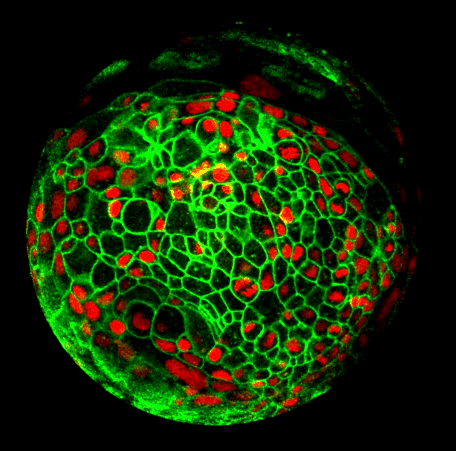Postdoctoral job: developmental biology of a marine annelid, Institut Jacques Monod, Paris
Posted by Guillaume Balavoine, on 12 July 2018
Closing Date: 15 March 2021

Duration: two years
Start Date: autumn 2018
Salary: depending on experience
The topic: Segmentation is one of the most common features in animals and yet one of the most mysterious. The team led by Guillaume Balavoine explores the cellular and genetic bases of segment formation in the marine annelid Platynereis.
Segment formation in the annelid involves a special category of multipotent stem cells: teloblasts or posterior stem cells.
Platynereis is a very convenient model for microscopy and live-imaging. It is amenable to a number of genetic interference techniques such as morpholinos, RNAi and CRISPR-Cas9 knock-outs. Stable transgenesis can be performed using DNA transposition. We want to explore the biology of the teloblasts by developing a number of transgenic tools in Platynereis. We are performing clonal analysis using transgene mosaic insertions. We have developed a FUCCI tool to live-image the cell cycle transitions in individual cells.
Armed with these tools, we want to answer a number of questions concerning the stem cells: observe and characterize their lineage restrictions, observe asymmetric divisions and decipher the link between cell cycle and segment formation. Promising techniques such as light sheet microscopy, cell sorting and RNASeq analysis can be performed at the Institute.
The location: The Institut Jacques-Monod, funded jointly by the CNRS and the University Paris Diderot, is one of the main centers for basic research in biology in the Paris area. It is located near the center of Paris. The Institute provides an outstanding environment for research at the highest level and assembles around 30 groups working on genome and chromosome dynamics, cellular dynamics and signaling, development and evolution. The Institut Jacques Monod has developed a number of important core facilities, which all offer state-of-the art instrumentation and a high level of expertise. These include a large microscopy imaging platform and a genomics-transcriptomics facility.
Requirements: Candidate must have obtained PhD by the start date. Candidate will usefully have experience in developmental biology, including micro-injection, confocal imaging and image analysis. The position will remain open until filled.
Contact: To apply, please send your CV with a cover letter stating your motivation and contact details of three persons for references, to :
Guillaume Balavoine, principal investigator.
e-mail: guillaume.balavoine at ijm.fr
+33 1 57 27 80 02


 (No Ratings Yet)
(No Ratings Yet)